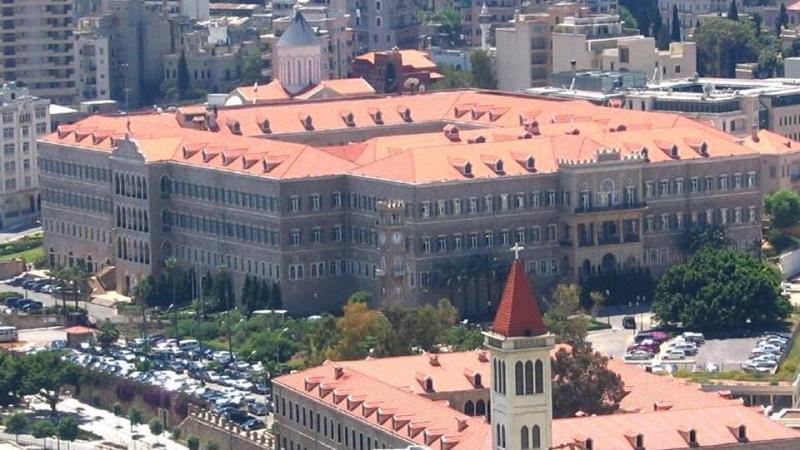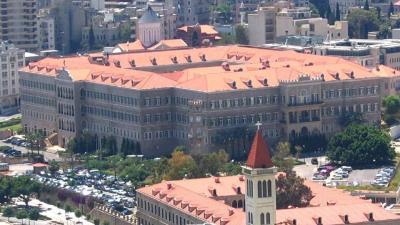The fate of the cabinet meeting called by caretaker Prime Minister Najib Mikati has become uncertain following a statement issued by nine ministers associated with former President Michel Aoun and the Free Patriotic Movement, announcing their boycott of the meeting and refusal to participate. Meanwhile, the meeting’s schedule is still listed on the government palace's agenda for this morning.
Political sources monitoring the situation expressed surprise in a call with "Anbaa" electronic newspaper at this sudden enthusiasm to protect the powers of the presidency and prevent their usurpation, asking: "Where were those concerned about these powers when the state collapsed and the country reached hell, as acknowledged by the President himself, who is supposed to protect the nation and uphold the constitution? Is concern for the president's powers expressed by obstructing his election? Is this how nations are built while the US dollar continues to rise, potentially reaching 50,000 Lebanese pounds before the end of the year, with those responsible for the solution divided over trivial matters? Indeed, this is a time of grave challenges."
Government sources confirmed through "Anbaa" electronic newspaper that the cabinet session is still on track, and each minister who boycotts the meeting must bear the responsibility for disrupting issues that affect people's lives. They stated that Mikati is fulfilling his responsibilities to address matters concerning the people by reviewing the agenda and limiting it to essential items, insisting that this meeting was not called for the sake of idle discussion, as the agenda was minimized to avoid embarrassment and align with the concerns of Maronite Patriarch Bechara al-Rahi.
In this context, Democratic Gathering member MP Bilal Abdullah stated in a call with "Anbaa" electronic newspaper that "there are matters concerning the people, and each minister must bear the responsibility of his decision. The agenda was shortened for this purpose," noting the rising sectarian rhetoric.
Conversely, member of the Strong Lebanon bloc MP Cesar Abi Khalil asserted that the call for a cabinet session fell through as soon as the nine ministers declared their boycott. In a conversation with "Anbaa" electronic newspaper, Abi Khalil reiterated that the bloc "had originally sought to form a fully empowered government in the event of a presidential vacancy, but the Prime Minister, whose mandate ended with the term of President Michel Aoun, insisted on forming a government of specialists to monopolize powers. This matter manifested in his call to violate the constitution and undermine the National Pact, a tendency he has had for some time to undermine the presidency either through practice or through powers," stressing that this would be met by them "with great firmness."
Abi Khalil considered that "the issue of hospital funding is not the problem, and it has been secured previously, as the council has not met since last May without encountering any issues," reiterating accusations against Mikati of "assaulting the powers of the president, which amounts to normalizing the constitutional vacuum and a breach of the constitution." In justifying their reluctance to elect a president to preserve powers, Abi Khalil acknowledged that his team would not facilitate presidential elections unless a majority was secured for their candidate, stating: "If we had the majority, we would not hesitate for a moment to elect a president, but neither we nor the other team possess that."
In light of this dispute, what does the constitution say? The head of the Justice Institute, lawyer Paul Marqous, pointed out in an interview with "Anbaa" electronic newspaper that "a caretaker government does not convene in principle, especially when its work is strictly limited as indicated in Article 64 of the post-Taef constitution, except in cases of extreme necessity that require meetings to address urgent and pressing matters that cannot be postponed and are only addressed through a government meeting. This meeting becomes necessary in the case of a presidential vacancy and without introducing any other items to the agenda that could be delayed."
Regarding the inclusion of the hospital funding item on the agenda, Marqous indicated the need to examine whether it necessitates a decision from the cabinet. If the inclusion of this item is essential for the continuation of healthcare services in the country, then the convening of the cabinet is constitutional.
Thus, the country enters a new fruitless debate, paying the price with the people's health and livelihood, while the solutions lie elsewhere. Worse yet, those who are obstructing the convening of a necessary cabinet meeting are the same individuals who hinder the presidential election, attending all voting sessions with blank ballots and presenting no new projects to complete the entitlement and save the country.




